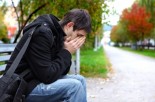But, for many others, anxiety and related phobias go far beyond being at the front of the room.
From a very young age, Scott Stossel struggled with a fear of heights, claustrophobia, separation anxiety, and more.
He still suffers in certain ways but has made great improvements since he started working on the "riddle" of anxiety.
To some degree, anxiety remains a riddle even to the doctors and scientists who study it. But, there have been advancements and improvements in both understanding and treating it.
Anxiety, like any emotion, is a result of something physical going on in your brain; a dysfunction of neurotransmitters, for instance. But, it's also a psychological problem and may even be partly due to philosophical/spiritual considerations.
Understanding how all of these factors work together can help you solve that riddle, or at least recognize what's going on when you experience anxiety.
There may also be a genetic element. This does not mean that you are doomed to suffer if anxiety or other disorders run in your family; but knowing the presence can also contribute to solving that riddle.
Listen in as Scott joins Lisa to share more about his personal story of anxiety, as well as how he has worked on solving the riddle.
Anxiety, like any emotion, is a result of something physical going on in your brain; a dysfunction of neurotransmitters, for instance. But, it's also a psychological problem and may even be partly due to philosophical/spiritual considerations.
Understanding how all of these factors work together can help you solve that riddle, or at least recognize what's going on when you experience anxiety.
There may also be a genetic element. This does not mean that you are doomed to suffer if anxiety or other disorders run in your family; but knowing the presence can also contribute to solving that riddle.
Listen in as Scott joins Lisa to share more about his personal story of anxiety, as well as how he has worked on solving the riddle.
